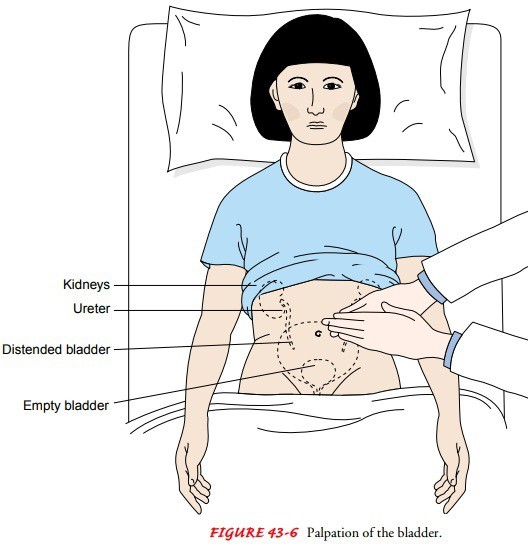A client has not voided eight hours after surgery and says to the nurse, “I don’t think I can urinate.” What should be the first action for the nurse?
Assess the client’s bladder.
Administer pain medication.
Increase the client’s fluid intake.
Inform the surgeon of the client’s status.
The Correct Answer is A
The nurse should first assess the client’s bladder for distention by palpating the lower abdomen between the symphysis pubis and the umbilicus.
This can indicate urinary retention, which is a common postoperative complication. The nurse should also measure the bladder volume using a bladder scanner if available.

Choice B. Inform the surgeon that the client’s status is wrong because the nurse should first assess the client before notifying the surgeon.
The surgeon may order interventions based on the assessment findings.
Choice C. Increasing the client’s fluid intake is wrong because increasing fluid intake may worsen bladder distention and discomfort.
The nurse should encourage fluid intake only after ensuring adequate urinary output.
Choice D. Administering pain medication is wrong because pain medication may not be indicated for urinary retention.
Pain medication may also cause urinary retention by relaxing the bladder muscles and impairing the micturition reflex.
Normal urine output is about 30 mL per hour or 240 mL in eight hours.
The nurse should monitor the client’s intake and output and report any signs of urinary retention to the surgeon.
Urinary retention can lead to infection, bladder damage, and renal impairment if not treated promptly.
Nursing Test Bank
Naxlex Comprehensive Predictor Exams
Related Questions
Correct Answer is B
Explanation
Are you taking the medication as prescribed? This is because warfarin is a blood-thinning medication that affects the prothrombin time (PT) and the international normalized ratio (INR).
The PT measures how long it takes for blood to clot, and the INR is a calculation based on the PT that standardizes the results across different laboratories. A normal INR range is 0.8 to 1.1 for people who are not taking warfarin. People who take warfarin usually have a target INR range of 2 to 3, depending on their condition.
An INR of 0.8 means that the blood clots faster than normal, which increases the risk of blood clots and strokes.
This could indicate that the client is not taking enough warfarin or is taking other medications or foods that interfere with warfarin’s effect.
Choice A is wrong because bleeding gums are a sign of excessive bleeding, which could happen if the INR is too high, not too low.
Choice C is wrong because blood in stools is also a sign of excessive bleeding, which could happen if the INR is too high, not too low.
Choice D is wrong because unusual bruising is another sign of excessive bleeding, which could happen if the INR is too high, not too low.
Correct Answer is D
Explanation
Insulin injection sites are rotated to prevent lipodystrophy, which is a condition where the fat tissue under the skin becomes lumpy or dented due to repeated injections.
Lipodystrophy can affect the absorption and effectiveness of insulin.
Choice A is wrong because bruising is not a common complication of insulin
injections. Bruising can occur if the needle hits a blood vessel, but this can be avoided by using a new needle each time and applying gentle pressure after the injection.
Choice B is wrong because infection is not a common complication of insulin
injections. Infection can occur if the skin is not cleaned properly before the injection or if the needle is contaminated, but this can be prevented by washing the hands and using alcohol swabs.
Choice C is wrong because bleeding is not a common complication of insulin
injections. Bleeding can occur if the needle hits a blood vessel, but this can be minimized by using a new needle each time and applying gentle pressure after the injection.
Whether you are a student looking to ace your exams or a practicing nurse seeking to enhance your expertise , our nursing education contents will empower you with the confidence and competence to make a difference in the lives of patients and become a respected leader in the healthcare field.
Visit Naxlex, invest in your future and unlock endless possibilities with our unparalleled nursing education contents today
Report Wrong Answer on the Current Question
Do you disagree with the answer? If yes, what is your expected answer? Explain.
Kindly be descriptive with the issue you are facing.
